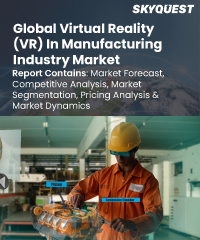
Report ID: SQMIG45D2054
Skyquest Technology's expert advisors have carried out comprehensive research and identified these companies as industry leaders in the Virtual Reality (VR) In Manufacturing Industry Market. This Analysis is based on comprehensive primary and secondary research on the corporate strategies, financial and operational performance, product portfolio, market share and brand analysis of all the leading Virtual Reality (VR) In Manufacturing Industry industry players.
Virtual reality-based research and development initiatives are anticipated to receive the attention of key participants in the manufacturing industry. The advantages of VR are being utilized by many producers in the industrial setting. For instance, the elevator maker Thyssenkrupp recently declared that its technicians would be utilizing Microsoft Hololens technology as a tool to enhance servicing operations. Service technicians can visualize and pinpoint elevator issues thanks to Hololens.
Virtual Reality (VR) In Manufacturing Industry Market Top Players Company Profiles
REQUEST FOR SAMPLE
Global Virtual Reality USD 4.48 Billion in 2024 In Manufacturing Industry Market size was valued at USD 5.83 Billion in 2025 and is poised to grow from USD 48.16 Billion by 2033 to 30.2%, growing at a CAGR of (2026–2033) during the forecast period (2025-2032).
Virtual reality-based research and development initiatives are anticipated to receive the attention of key participants in the manufacturing industry. The advantages of VR are being utilized by many producers in the industrial setting. For instance, the elevator maker Thyssenkrupp recently declared that its technicians would be utilizing Microsoft Hololens technology as a tool to enhance servicing operations. Service technicians can visualize and pinpoint elevator issues thanks to Hololens. 'Unity Technologies (US) ', 'Microsoft (US) ', 'Google (US) ', 'Sony (Japan) ', 'HTC Corporation (Taiwan) ', 'Samsung (South Korea) ', 'Facebook Technologies, LLC. (US) ', 'EON Reality, Inc. (US) ', 'Magic Leap, Inc. (US) ', 'WorldViz (US) ', 'NextVR Inc. (US) ', 'NVIDIA Corporation (US) ', 'Virtuix (US) ', 'Groove Jones LLC (US) ', 'Dassault Systèmes (France) ', 'PTC Inc. (US) ', 'Siemens AG (Germany) ', 'Eon Reality, Inc. (US) ', 'Amaze VR (US) ', 'Oculus VR (US) '
The development of cutting-edge technologies is expected to support the use of VR in the manufacturing industry: Leading advances in the manufacturing sector are being driven by the emergence of cutting-edge technologies like Industry 4.0, digital twins, virtual reality, artificial intelligence, and others. VR and digital twin technology together will offer useful insights into the product manufacturing process. One of the main uses of VR in the manufacturing sector is the introduction of industrial robots. The use of VR in the industrial sector allows designers to replicate their designs using cutting-edge VR technologies. They may fix mistakes at the first stage and cut down on production time and expense by doing this.
Prototyping using VR: Producing physical prototypes is a standard technique for manufacturers to test and improve design, development, and safety concepts, which can be costly and time-consuming. Car manufacturers can generate digital twins of the vehicles using VR-powered prototyping, which gives them more freedom to experiment with ideas, tweak concepts, and fine-tune constraints. Automakers and designers can see the finished product in virtual reality before it is ready. Ford and other businesses already use virtual reality (VR) in prototyping to increase creative freedom and lessen their direct environmental effect. This is expected to positively affect the virtual reality (VR) in the manufacturing industry market and boost the overall growth of the market over the forecast period.
Based on the region, the North American region currently dominates the global virtual reality (VR) in the manufacturing industry market share. North America earned the highest revenue in 2021 and is expected to maintain a commanding market share throughout the projected period. The region's early embrace of cutting-edge technology has helped fuel market expansion and given thrust to the region's established IT infrastructure.
Want to customize this report? This report can be personalized according to your needs. Our analysts and industry experts will work directly with you to understand your requirements and provide you with customized data in a short amount of time. We offer $1000 worth of FREE customization at the time of purchase.
Feedback From Our Clients

Report ID: SQMIG45D2054
sales@skyquestt.com
USA +1 351-333-4748